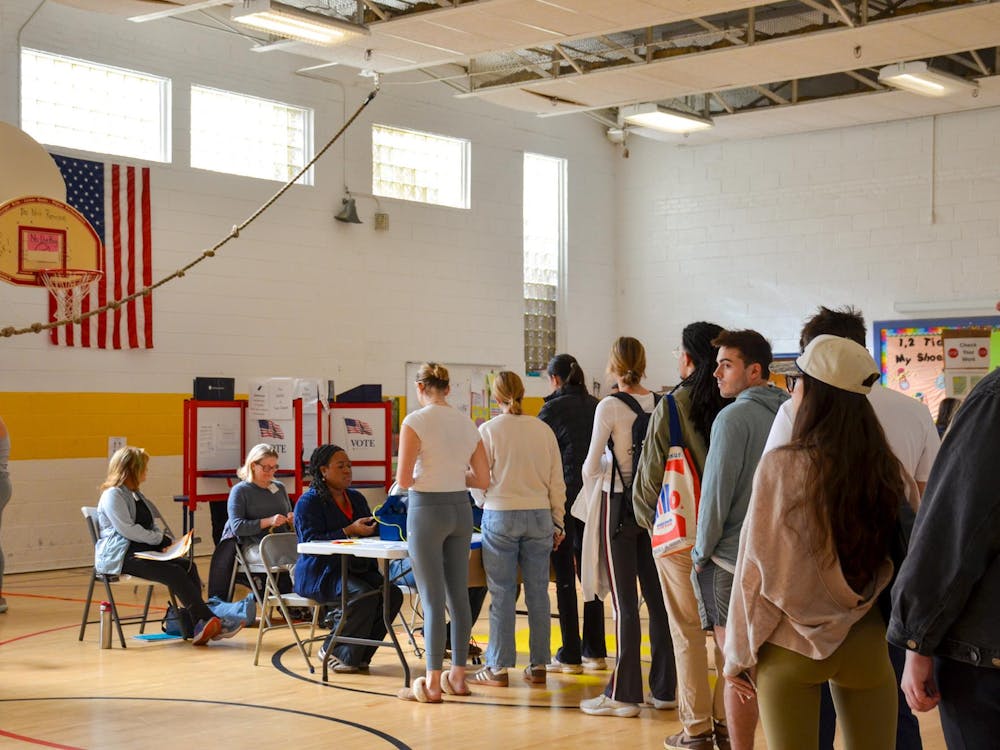Every day, people cross the train tracks behind the Corner, cutting several blocks from their walk to class or work. Charlottesville Police are working to curtail these instances of trespassing on the property of CSX Corporation, according to Lieut. Ronnie Roberts.
“It’s just an area that you should not walk on,” Roberts said. “They [the trespassers] are on private property and it’s our job to enforce the law.”
Last month, 58 people were brought to court and given the choice of a $106 fine or 20 hours of community service, Roberts said. One second-year College student, who wished to remain anonymous because of his use of the illegal bypass, said his brother was recently ticketed and is currently completing the 20 hours of service. The same student added, though, that his brother’s run-in with the law would not deter him from continuing to use the shortcut.
“They shouldn’t be ticketing people,” the anonymous student said. “It’s just such a pain to go around. I know it would be a lot, but if they really wanted people to stop, they could build a bridge over it.”
Student Council College Rep. Sam Davies, chair of Council’s Building and Grounds Committee, said his organization has discussed the possibility of building a bridge spanning the area near Chancellor Street and Virginia Avenue, approximately 150 yards from Beta Bridge. Previously, he said, Council officials explored the feasibility of building a pedestrian crossing near the intersection of 14th Street and Wertland Avenue, but those ideas met opposition from the railroad company.
“What [Student Council President Matt Schrimper] told me was that the company didn’t want to be put at risk, if someone used the pedestrian bridge and was injured,” Davies said, noting that Council has now moved on to discussing the potential construction of a bridge elsewhere.
“I’ve been speaking with a local architect about it,” Davies said. “We’re trying to get a concrete estimate of how much something like this would cost. The other day, we were out there with school administrators, and they seemed receptive to the idea. But we are still concerned, because there are a lot of factors.”
Davies said those factors include the fact that the bridge would cross into several different private properties. The estimated cost — perhaps $1 million, Davies said — might also pose a roadblock.
While Davies and other Council representatives explore such ideas, though, many students and local residents continue to cross the train tracks. One local construction worker, who also wished to remain anonymous, in order to avoid police consultation, said he frequently sees people crossing the tracks illegally. Most of these people, he said, seem aware that what they are doing is potentially illegal or dangerous: They look around before stepping across.
Still, some cross the tracks without knowing the possible consequences of their actions. One University employee who crossed the tracks — and requested anonymity — said she was surprised to learn about the possible legal ramifications of her trespassing, but said she did not agree with the police department’s approach to resolving the problem.
“I appreciate their concern for people’s safety, but we’re adults,” she said. “If you can’t see a train coming, you’ve got problems.”
Roberts, though, said safety is a real concern. He noted that everyone looks for the shortest way to get from one destination to another, but also said his department does not want students or local residents to become victims — or even put themselves in the position to become potential victims.
“We’ve had injuries due to trains,” he said. “There have [also] been a number of reports of criminal activity in that area ... there are folks that prey upon people in these dark areas, crimes of opportunity.”
Cory Gross, an employee of the parking lot near the train tracks, however, disputed such safety concerns, saying they were being blown out of proportion.
“We’re here [in the parking booth] by the tracks so late into the night, people are much more likely to get mugged somewhere else,” he said.
Gross described how he has recently seen the trespassing ban enforced.
“First, they just sat in their cars [by the tracks] and picked people off, but then people figured out what they were doing, so they [the police] started hiding behind the electric pole, just generally ruining people’s nights,” he noted.
Roberts, though, explained that the police action seeks, in addition to ensuring the safety of local residents and students, to avoid instances when further illegal action ensues. He said in addition to the act of trespassing, there have recently been other reported illegal interactions with the trains themselves, including an incident wherein a University student jumped onto a passing train, riding it for some distance. Roberts noted that this was perhaps an alcohol-related incident.
“The bottom line here is that I need to get folks to comply and get them to use the appropriate routes,” Roberts said. “When you put yourself on the tracks, you put yourself in danger. I need everybody’s cooperation on this.”
Making trespassers aware of the potential for legal action and endangering situations, however, does not always result in such cooperation. One female University student, who also requested anonymity and declined to provide her year and school, said she was surprised to learn that the police could ticket people who crossed the tracks and added that she wanted to avoid being cited with a violation.
“I don’t want a ticket,” she said. “That boggles my mind.”
She still turned, though, and crossed the tracks.






